
|
Explanation: What if you could "see" gamma rays? If you could, the sky would seem to be filled with a shimmering high-energy glow from the most exotic and mysterious objects in the Universe. In the early 1990s NASA's orbiting Compton Observatory, produced this premier vista of the entire sky in gamma rays - photons with more than 40 million times the energy of visible light. The diffuse gamma-ray glow from the plane of our Milky Way Galaxy runs horizontally through the false color image. The brightest spots in the galactic plane (right of center) are pulsars - spinning magnetized neutron stars formed in the violent crucibles of stellar explosions. Above and below the plane, quasars, believed to be powered by supermassive black holes, produce gamma-ray beacons at the edges of the universe. The nature of many of the fainter sources remains unknown.
|
January February March April May June July August September October November December |
| |||||||||||||||||||||||||||||||||||||||||||||||||||||||
NASA Web Site Statements, Warnings, and Disclaimers
NASA Official: Jay Norris. Specific rights apply.
A service of: LHEA at NASA / GSFC
& Michigan Tech. U.
Based on Astronomy Picture
Of the Day
Publications with keywords: pulsar - quasar - gamma ray
Publications with words: pulsar - quasar - gamma ray
See also:
- APOD: 2025 August 24 Á The Spinning Pulsar of the Crab Nebula
- Supernova Remnant CTA 1
- APOD: 2024 August 21 Á Fermis 12 year All Sky Gamma ray Map
- APOD: 2024 July 23 Á The Crab Nebula from Visible to X Ray
- APOD: 2023 September 6 Á HESS Telescopes Explore the High Energy Sky
- Supernova Cannon Expels Pulsar J0002
- The Spinning Pulsar of the Crab Nebula
